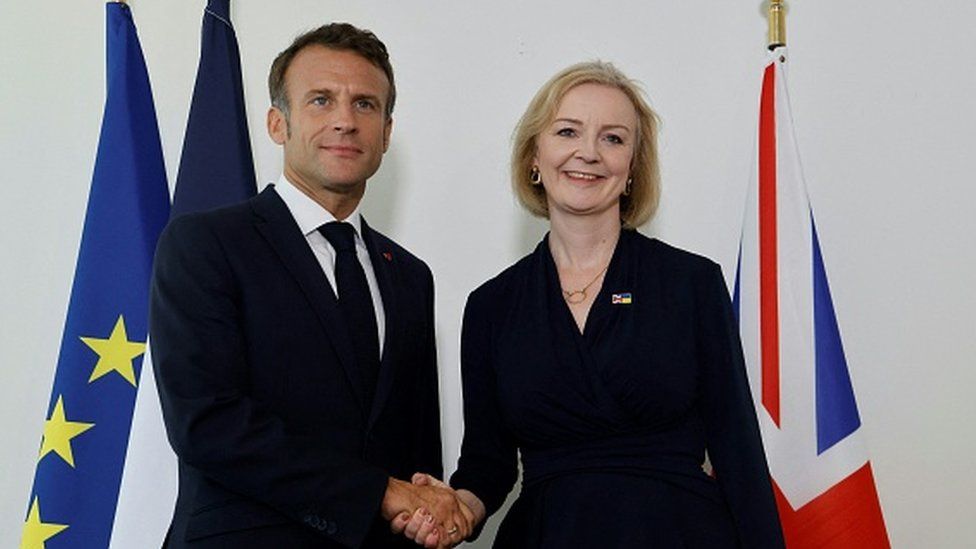ARTICLE AD BOX
 Image source, Getty Images
Image source, Getty Images
The idea of a new nations club was first mooted by French President Emmanuel Macron
By Jessica Parker
BBC Brussels correspondent in Prague
Prime Minister Liz Truss will seek to assert the UK's role in Europe when she attends a historic first meeting of a new political club of nations.
More than 40 countries will be at the summit of the European Political Community (EPC) in Prague.
World leaders will discuss energy, migration and security, with a focus on the war in Ukraine.
Ms Truss will say Russian aggression means Europe is facing its "biggest crisis since the Second World War".
Downing Street only confirmed her attendance late last week, with the prime minister travelling from a Conservative Party conference overshadowed by divisions and the economic fallout from her tax-cutting mini-budget.
Ms Truss will hold talks with French President Emmanuel Macron and others on Thursday, in what could mark a new phase in the UK's post-Brexit relations with Europe.
The UK, Switzerland, Turkey, Norway, Iceland, Georgia, Azerbaijan and Western Balkan countries are among non-EU members who will join the first gathering of the EPC.
The EU's 27 member states will also be there, ahead of a separate meeting on Friday.
The EPC has been championed by the French President Emmanuel Macron but there's scepticism, even within the EU, about the new forum.
Critics see it as a vague regurgitation of old ideas.
But France believes it is a "historic" gathering - unique in scale and context - that can help "rebuild stability on our continent" in the wake of Russian President Vladimir Putin's decision to invade Ukraine.
Ms Truss had been hostile to the EPC project, so what changed?
Warming up
Some observers point out it was never likely she would voice passionate enthusiasm for a French-led European meet-up while vying for the Tory leadership.
But once in power she appeared to warm to the idea, although Downing Street is reluctant to accept suggestions Mr Macron won her over.
It might prove to be a "modest" turning point in EU-UK relations, says the director of the Centre for European Reform, Charles Grant.
While a row about post-Brexit arrangements for Northern Ireland remains unresolved, talks are restarting this week.
"Neither side is trying to push that issue to the brink at the moment," says Mr Grant. "So this summit could be a sign of a modest rapprochement."
The official line is that the PM is heading to Prague because she wants to "shore up" support for Ukraine and "galvanise" collective action on energy security and migration.
Downing Street says Ms Truss will call on leaders to keep oil and gas interconnectors open this winter while taking part in talks on joint projects to develop new nuclear and offshore wind capacity.
She'll have a one-on-one with Mr Macron, as France and the UK continue to clash over how to tackle dangerous small-boat crossings in the Channel.
Another draw for the UK is Turkey, a big non-EU player. Norway, a key supplier of energy to the UK, is also showing up.
The UK has been less keen to talk about security, with jitters that the EPC could be seen as somehow cutting across the Nato military alliance.
However, Russia's invasion of Ukraine is a key part of the picture.
Diverse agendas
The UK isn't alone in hoping that the meeting will demonstrate European unity.
A senior EU diplomat said the meeting would send a "strong signal" to President Putin.
If the EPC does prove short on solid outcomes, then expect it to be long on messages about support for Ukraine and condemnation of the Kremlin.
In the opening session, Ukrainian President Volodymyr Zelensky will give a video address while Ms Truss will also take the floor, where she'll say the threat from Russia was "left to fester for far too long".
Image source, Getty Images
Image caption,Ukrainian President Volodymyr Zelenskyy will address the summit via video-link
But not all those attending are of one mind on the conflict.
"One of the measures of success will be does it persuade Serbia, Azerbaijan and Turkey to lean a bit more to the West and less towards Russia?" says Mr Grant.
Turkey's talked of a "balanced" approach to Russia and hasn't signed up to Western sanctions.
"When first proposed by Macron, the EPC was supposed to be club with shared democratic values but it's now more about making sure Europe as a whole isn't Russia's friend," says Mr Grant.
Uncertain identity
A sign of the uncertainty about what the EPC is really for is that there have been far clearer messages about what it is not.
It's not a substitute for NATO or the G7, we're told.
It's not a slightly comfier "waiting room" for countries eager to join the EU.
Nor it is a forum that will be dominated by EU institutions.
That's despite invites having been issued by the president of the European Council, Charles Michel, while the meeting itself has been tacked onto the front of an EU summit.
Brussels insists it has merely been facilitating the forum - it's not "the EU plus plus", insisted one senior official.
The next EPC, in either six months or a year's time, is likely to be held in Moldova.
If the project survives, the UK is currently fourth in line to host a summit.
But British officials are keen to play it cool on the EPC, insisting they will walk away if it evolves in an undesirable direction.

 2 years ago
23
2 years ago
23








 English (US) ·
English (US) ·